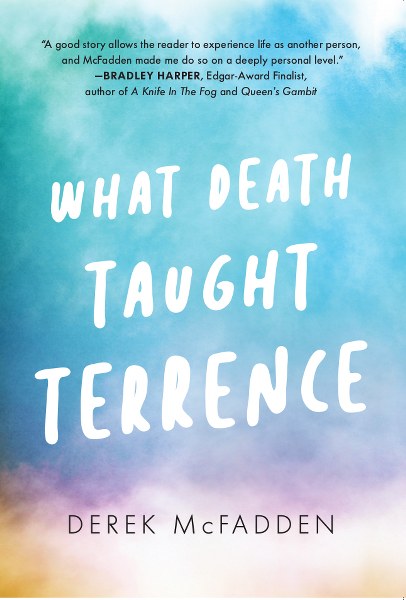
What Death Taught Terrence by Derek McFadden Genre: Inspirational Fantasy
LIFE IS A JOURNEY. SO IS THE AFTERLIFE. At the end of his life, Terrence McDonald must discover its meaning, or he’ll be banned from the afterlife forever, and his soul will cease to exist. Join Terrence– and those who love him–on a poignant and unforgettable journey through a life at once wonderful and harrowing. Learn what Terrence learns. See what Terrence sees. By this provocative story’s end, readers may even learn a thing or two about themselves. *** The TV is on, and I’m on the couch, leaning as far back as I can. My heavy, indecisive brown eyes—their lenses blurred ever since my tumultuous, too-soon entrance into the world—flutter between open and shut. I am half-watching half-listening to a football game on a Sunday afternoon. Was that the doorbell? “Who is it?” I call out, expecting to hear my daughter, Megan’s, voice. These days, she is the one person who visits me. The only person who knows I’m making my home in this little oasis fashioned from wood felled by my own hand. “Terry, it’s Mom. I’m here to help you move.” My mom? That’s not possible. She’s… Wait. To help me move? Oh, God. I rise from the couch and glance back at my lifeless body. PRAISE FOR What Death Taught Terrence “What Death Taught Terrence offers a powerful, painful, and poignant look at the life of a man rarely encountered in fiction. Derek McFadden’s writes with an insight few can match.” — T.F. ALLEN, author of The Night Janitor and The Keeper “A good story allows the reader to experience life as another person, and McFadden made me do so on a deeply personal level. If you like the works of Mitch Albom, I think you’ll find What Death Taught Terrence a worthy addition to your library and the reading of it a lifeaffirming journey.” — BRADLEY HARPER, Edgar-Award Finalist, author of A Knife In The Fog and Queen’s Gambit “In What Death Taught Terrence, Derek McFadden builds a world that satisfies both our desire for imagination and our need for personal introspection. I found this (story) immediately immersive, and it stuck with me long after I finished. McFadden is doing something rare in today’s fiction—exploring the limits of what we will believe to form a better understanding of who we are.” — ALEX DOLAN, author of The Euthanist and The Empress of Tempera Add to GoodreadsAmazon * B&N
Derek McFadden is the author of the novel What Death Taught Terrence, available in February of 2020 wherever fine books are shelved. Other works of note include the well- regarded Prose From A Grandson To A Senior Fellow. Born with a mild case of cerebral palsy, his is “a voice for those whose voices have yet to be heard,” according to the online publication Audacity Magazine. Website * Facebook * Twitter * Bookbub * Amazon * Goodreads

Death, Part 1
Terrence McDonald is 55. The year is 2045.
The TV is on, and I’m on the couch, leaning as far back as I can. My heavy,
indecisive brown eyes—their lenses blurred ever since my tumultuous, too-soon
entrance into the world—flutter between open and shut. I am half-watching half-
listening to a football game on a Sunday afternoon. Was that the doorbell?
“Who is it?” I call out, expecting to hear my daughter, Megan’s, voice. These days, she is the one person
who visits me. The only person who knows I’m making my home in this little oasis fashioned from wood
felled by my own hand.
“Terry, it’s Mom. I’m here to help you move.”
My mom? That’s not possible. She’s…
Wait. To help me move? Oh, God.
I rise from the couch and glance back at my lifeless body. Five-foot-eight standing up, but now it’s
slumped over, grayish-blue. A few stray locks of the hair I inherited from my father, still mostly pepper-
black, spill over into my unseeing eyes.
Shit. I still had more I wanted to do, damn it! Was it my cerebral palsy? We’ve
co-existed forever. Has it somehow—in its slow, indirect way—finally done me
in?
I turn back around toward the TV, and I see my mom materialize in front of me, a
concerned look on her face.
“Are you okay?”
“No, of course I’m not okay!” I scream. “So… is that it then? I’m dead, just like
that?”
She doesn’t say anything, but her silence says everything.
“How? How did I die?”
Mom puts her hand on my shoulder like she always did when I was a kid and I
was upset and needed some time to calm down. “You don’t remember?”
“No, Mom, I don’t remember. If I remembered, why would I ask?”
She is silent for another beat. “If you don’t remember… then it’s probably best if
I stay quiet for now. My job is to take you Home.”
“I am home,” I shoot back.
“You don’t understand. Where I’m taking you… this is a different kind of
Home. This is the place where you’ll find out what happens next.”
“Is there any way around this? Any way at all?”
These words are as close as I’ve ever come to arguing with my mom. That’s
because arguing with her does not come naturally to me. And, considering the life
I have, I never thought I’d hear myself plead for it.
“No, Terry. I’m sorry, but there’s not. You know that, if there were a way, I’d tell
you what it was. But this has been decided.”
I pull away from her. Am I frightened? No, not exactly. But I am… disheartened.
Before I can go too far, she takes my hand. “Come with me, Terry. I love you.”
It’s been so long since Mom said those words to me—I love you—that I’d
forgotten how true and convincing they sounded in her voice, and how
much I missed them… and her.
Without warning—and without the white-light-emitting tunnel I experienced as a
kid— we’re not in the cabin anymore, and I find myself in a house so familiar I
am comfortable in seconds. The smells are familiar. The floorplan. The art on the
walls. This is a replica of the home I shared with my wife, before she got sick and
I moved into the cabin.
“See, it’s not so bad,” Mom says. “I picked it out and furnished it myself. Just for
you.”
It is a nice place. Much nicer than I’m used to these days, that’s for sure. Not that
I have anything but a vague idea where we are.
Now that I’ve calmed down some, it isn’t just this new house I’m appraising. I’m
also getting my first real good look at Mom in twenty years. Hers is a face
looking as youthful today as it appeared in the photograph announcing her
entrance into womanhood—taken in her eighteenth year. I remember seeing this
picture in a family album decades ago.
“You’ve got all the comforts you’re used to,” Mom explains. “Along with a
couple you might have forgotten about.”
“So this is where I’ll be living now?”
The frown on her face hints at the fact that things aren’t that simple. “Well, that
depends on your appointment, but I sure hope you will. Your father and I are just
down the street.”
“Dad’s here?”
“Yes, he made it.” She smiles. She’d told me as much before. Years ago, on her
final day. She’d said it twice, in fact. I’m not sure I’d believed her either time.
“My appointment?”
“Everyone has an appointment when they first get here.”
“What happens? Who is the appointment with?”
“I can’t tell you, Terr.” Mom takes a seat in the first of three chairs arranged in
front of my large television screen. This is the only liberty she’s taken in the
design. The original home had two chairs in front of this television, because two
was enough for Mattie and me, but I sense Mom gave me the extra seat in case I
should have company over. “Those who have been through their own
appointments, like me, are expressly forbidden from sharing any details with
newcomers, like you. Each appointment is different based on the soul and the life
it concerns.”
“Ah.” Now I’m nervous. And not just because I get the feeling at this moment
that Mom is spouting some section of a well-rehearsed monologue. I wonder if, at
this appointment, everything in a person’s life is considered.
“Yes, everything is considered,” Mom says.
I shoot her a confused glance. Did she just read my mind?
“Oh, I’m sorry. We don’t often use spoken words or languages here. I mean,
we can. And we will, especially in cases when explanations or announcements
need to be delivered to a large number of people. God prefers spoken language
Himself. But it’s more common, for those who have been Home a while, to
communicate telepathically. I thought that was what you were doing.”
I shake my head.
“Well, in a few days, once you’re feeling acclimated, let me know. You can call
me on this.” Mom produces what looks like a cell phone. “That’s a direct line to
me and me alone. When you’re ready, I’ll come and pick you up and take you to
your appointment.”
“Okay.”
But first, she thinks, get some rest. You look terrible.
I am a little tired, but what do you expect? I’m dead.
“You’re getting the hang of our telepathy already.” She laughs, gives me a
hug. “I’ve gotta get back to cook your father’s pot roast, or he might go a little
nuts.”
Sounds like Dad. A hungry Carl McDonald means an irritable, hard-to-deal-with
Carl McDonald (I was going to say hard-to-live with, but the word doesn’t fit).
Mom pats my shoulder and disappears. This new Home is going to mean some
big adjustments for me.
Follow the tour HERE for special content and a giveaway!a Rafflecopter giveaway







